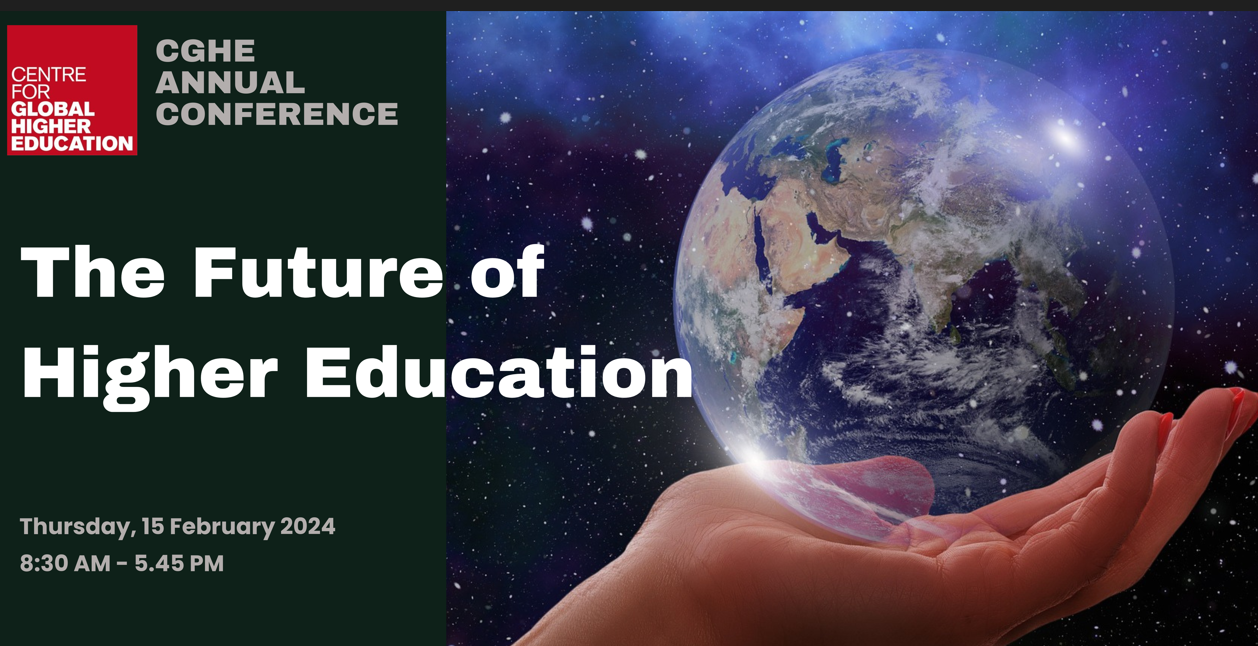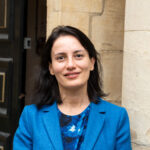CGHE Annual Conference 2024 – The Future of Higher Education
- Claire Callender, University College London
- Paul Ashwin, Lancaster University
- Simon Marginson, University of Oxford and University of Bristol
- Chris Millward, University of Birmingham
- Golo Henseke, IOE, UCL’s Faculty of Education and Society
- Ka Ho Mok, Hang Seng University (Hong Kong)
- Debbie McVitty, Wonkhe
- Lorraine Dearden, IOE, UCL’s Faculty of Education and Society
- Jenni Case, Virginia Tech (US)
- Vincent Carpentier, University College London
- Maia Chankseliani, University of Oxford
- David Mills, University of Oxford
- Tristan McCowan, University College London
- Diana Laurillard, IOE, UCL’s Faculty of Education and Society
- Eileen Kennedy, IOE, UCL’s Faculty of Education and Society
- Alis Oancea, University of Oxford
- Michael Shattock, University of Oxford
- Vivienne Stern, UUK
- Joanna Newman, SOAS
- David Sweeney, University of Birmingham
- Ellen Hazelkorn, BH Associates and TU Dublin
- Aline Courtois, Department of Education at the University of Bath
- Janja Komljenovic, Lancaster University
- Lee Rensimer, University College London
- Xin Xu, University of Oxford
- Nick Hillman (HEPI), University of Manchester, University of Buckingham, National Foundation for Educational Research.
- Jürgen Enders, University of Bath
The CGHE Annual Conference returns for its ninth edition on 15 February 2024. This is the final conference during the period of CGHE’s UKRI Economic and Social Council funding award (1 November 2015 to 30 April 2024), where CGHE researchers will discuss key insights arising from their projects. There are exciting plans to maintain and develop CGHE as a self-supporting research centre after that date, with your active participation. More information will be provided on 15 February.
The conference will be provided in both in-person and on-line live-stream mode via Zoom. The in-person conference, which is highly participatory, will take place in London at Jeffrey Hall, UCL Institute of Education, 20 Bedford Way, London, WC1H 0AL.
Those who attend the in-person conference will have the opportunity to take part in breakout discussion groups following the two main panel sessions at the conference. The on-line live-stream mode is broadcast only.

Thursday 15 February 2024
Jeffery Hall, UCL Institute of Education
8.30-9.00
Coffee and registration
9.00-9.05
Conference opening and welcome
Chair and speaker: Claire Callender (IOE, UCL’s Faculty of Education and Society and Birkbeck)
9.05-10.15
Opening keynote and 2024 Burton R. Clark Lecture – The three dilemmas of higher education: Reflections on Clark, CGHE and higher education research
Chair: Paul Ashwin (Lancaster University)
Speaker: Simon Marginson (University of Oxford)
WATCH RECORDING FOR CONFERENCE OPENING, OPENING KEYNOTE AND 2024 BURTON R.CLARK LECTURE
Abstract
The leading modernist scholars of higher education were all from the University of California in the 1960s-1980s: Clark Kerr, Martin Trow and Burton (Bob) Clark. They tracked the massification of the sector, the growing role of research and the transformation of the university, first in the United States and then beyond. Clark’s legacy was a fulsome and subtle insight into departments, institutions and national systems. But as mass tending to universal higher education has spread across the world, a process still unfolding, three fundamental dilemmas have become apparent, playing out in different ways in varying national-cultural contexts. First, is equality of opportunity impossible? Growth and equitable access have been unable to secure a lasting equalisation across national populations of social opportunity, while higher education’s role in reproducing social hierarchy has become a driver of reactionary populism. Second, is higher education economic or cultural? The intrinsic function of higher education is the cultural formation of students in classroom learning and knowledge, yet the neoliberal policy revolution that began in the 1980s, and coloured Clark’s later work, positions higher education as a branch of the economy, managed as a competitive business and producing employability as a commodity. This has generated unresolvable tensions. Third, are higher education and knowledge essentially national or global? Knowledge sharing and creation across borders, cosmopolitan world citizenship, decolonisation, and learning through the other contend with nationalist and nativist governments, neo-colonial science, geopolitics and decoupling, and the hierarchies and barriers that limit access to mobility.
The three dilemmas shape the politics and practice of higher education across the world and have often preoccupied higher education studies/research as a field. Research on higher education is predominantly instrumental and often limited to institutional agendas, but in their high minded moments researchers adopt a critical outlook and investigate more equal power in education and society, intrinsic learning and knowledge as means of advancing student agency and enlightening society, and a relational and inclusive global. The Lecture reviews CGHE’s work in the higher education studies field, in the light of the three dilemmas, and suggests ways of taking the research agenda forward in a changing environment. The climate-nature emergency, and its fallout in the destabilisation of government and politics, is rapidly creating a fourth challenging dilemma.
10.15-10.30
Coffee/tea break
10.30-11.45
Theme Panel 1: What are the effects of higher education for graduates?
Chair: Chris Millward (CGHE Advisory Board) (University of Birmingham)
Speaker:
Paul Ashwin (Lancaster University), leader of CGHE project “Graduate Experiences of Employability and Knowledge”
Speaker:
Claire Callender (IOE, UCL’s Faculty of Education and Society and Birkbeck), leader of CGHE project “Student loan debt and graduate decision-making”
Speaker:
Golo Henseke (IOE, UCL’s Faculty of Education and Society), leader of CGHE project “Graduate labour market and equity”
Speaker:
Ka Ho Mok (Lingnan University Hong Kong), leader of CGHE project “UK international graduates in mass media and public perceptions: A comparative study of the UK, Mainland China, Hong Kong and Taiwan”
WATCH RECORDING FOR THEME PANEL 1
11.45-12.45
Discussion in 4 breakout groups: What are the effects of higher education for graduates?
Rooms and chairs of breakout groups:
Jeffrey Hall – Debbie McVitty (Wonkhe)
Nunn Hall – Nick Hillman (HEPI, University of Manchester, University of Buckingham, National Foundation for Educational Research)
Drama Studio – Lorraine Dearden (IOE, UCL’s Faculty of Education and Society)
Elvin Hall – Jurgen Enders (University of Bath)
12.45-1.45
Lunch
1.45-3.30
Theme Panel 2: Worldwide higher education? What are the similarities and differences between national systems?
Chair: Jenni Case (Virginia Tech US)
Speaker:
Vincent Carpentier (IOE, UCL’s Faculty of Education and Society), leader of CGHE project “A historical lens on higher education staffing: UK and France”
Speakers:
Maia Chankseliani (University of Oxford), David Mills (University of Oxford), Tristan McCowan (IOE, UCL’s Faculty of Education and Society), CGHE project “Mapping supranational higher education space”
Speakers:
Diana Laurillard (IOE, UCL’s Faculty of Education and Society), Eileen Kennedy (IOE, UCL’s Faculty of Education and Society), CGHE project “Realising the potential of digital technology for scaling up higher education”
Speaker:
Simon Marginson (University of Oxford), leader of CGHE project “Local and global public good of higher education: 10 nation study”
Speaker:
Alis Oancea (University of Oxford), leader of CGHE project “Research on Research: the research function and mission of higher education”
Speaker:
Mike Shattock (University of Oxford), leader of CGHE project “The governance of higher education: a comparative study”
WATCH RECORDING FOR THEME PANEL 2
3.30-4.30
Discussion in 4 breakout groups: Worldwide higher education? What are the similarities and differences between national systems?
Rooms and chairs of breakout groups:
Jeffrey Hall – David Sweeney (University of Birmingham) and Ellen Hazelkorn (BH Associates)
Nunn Hall – Vivienne Stern (UUK)
Drama Studio – Joanna Newman (SOAS)
4.30-4.45
Break
4.45-5.45
Closing plenary: Future research on higher education
Chair: Simon Marginson (CGHE Director)
Speakers:
Aline Courtois (University of Bath), Janja Komljenovic (Lancaster University), Lee Rensimer (IOE, UCL’s Faculty of Education and Society), Xin Xu (University of Oxford)
5.45
Conference close
Chair and speaker: David Mills (CGHE Deputy Director)
Event Notes
For any further queries about the conference, please contact
Emily Betz (IOE, UCL’s Faculty of Education and Society)
e.betz@ucl.ac.uk
or
Kristina Khoo-Rhodes (Department of Education, University of Oxford)
kristina.khoo-rhodes@education.ox.ac.uk
Please find the General Privacy Policy of UCL, one of our partner universities, here: https://www.ucl.ac.uk/legal-services/privacy/general-privacy-notice

